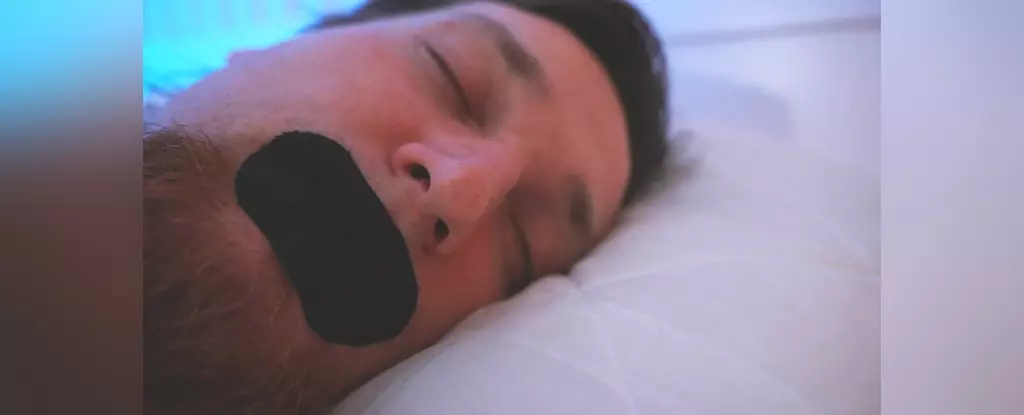For many individuals, the act of breathing through the mouth during sleep has become a distressing reality—often leading to snoring and more severe conditions like obstructive sleep apnea. In the relentless quest for better sleep, more and more people are exploring the trend of mouth taping, a practice that involves sealing the mouth shut with medical tape, purported to foster a myriad of benefits ranging from improved sleep quality to better oral health. However, despite its increasing popularity on social media platforms like TikTok, this approach begs for critical scrutiny and substantial medical examination.
The Allure of Social Media Solutions
The trend of mouth taping has exploded on social media, with influencers claiming that a simple piece of tape can unlock a range of health benefits. From aesthetic improvements like a chiseled jawline to enhanced energy levels, the purported advantages seem tantalizingly simple. However, such claims often lack rigorous scientific validation. Anecdotal evidence proliferates on platforms where impressions often outweigh concrete data, leading users to overlook potential risks embedded within these seemingly innocent practices.
The Science Behind the Trend
While mouth taping has ignited interest among night-time breathers, research into this technique remains scant and underwhelming. Existing studies primarily encompass patients who experience mild sleep apnea or mouth breathing episodes in a controlled, clinical environment. These studies attempt to measure impacts on apnea severity, typically using metrics like the apnea-hypopnea index—a numerical representation of sleep interruptions. Yet, even in these limited cases, the benefits appear questionable.
The scientific community has rightly raised concerns regarding mouth taping, particularly in patients with underlying nasal obstructions such as sinus infections or anatomical issues in the nasal passages. For these individuals, simply taping the mouth shut can exacerbate respiratory issues and introduce dangerous complications, such as asphyxiation. The risks are worth pondering: if a physical impediment prevents proper nasal breathing, sealing the mouth is merely a superficial, and potentially hazardous, fix.
Poor Quality Evidence
An analysis of the ten most significant studies on mouth taping reveals a discouraging trend—many suffer from lack of rigor. Issues include insufficient follow-up with participants, non-representative sample sizes, and inadequately controlled variables. As such, the validity of their conclusions is compromised, raising red flags about this supposedly easy solution. The researchers have emphasized that mouth taping may show limited success in mild cases, yet it offers no advantage in more severe instances where the causes of mouth breathing lie deeper and more complex.
A Call for Professional Intervention
With the prevalence of ineffective quick fixes such as mouth taping, it’s paramount to redirect focus towards professional healthcare solutions. For individuals struggling with their sleep or dealing with the disruption caused by snoring and gasping, consulting an expert should be their next logical step. Medical professionals can diagnose the root causes of sleep disturbances and recommend appropriately tailored treatments instead of allowing detrimental habits to masquerade as solutions.
Real Solutions Over Fads
While the appeal of a simple, non-invasive fix like mouth taping is understandable, reality dictates that health concerns—especially those as critical as breathing patterns during sleep—require thorough examination and intervention. Comprehensive assessment methods, such as sleep studies, nuanced discussions of symptoms, and targeted therapies, stand far above any social media trend in terms of efficacy and safety.
In this era of lacking patience for medical solutions and an abundance of easily consumed information, it’s essential to recognize that the path to better health often leads through the complexities of qualified medical advice. Seeking sustainable, evidence-based interventions will yield far more significant improvements in health than the fleeting allure of TikTok remedies.


Leave a Reply